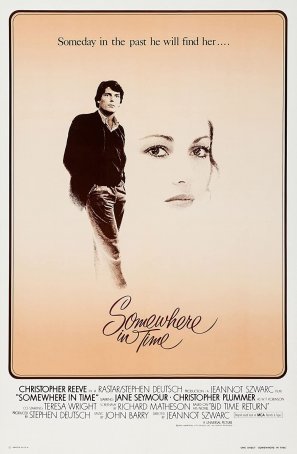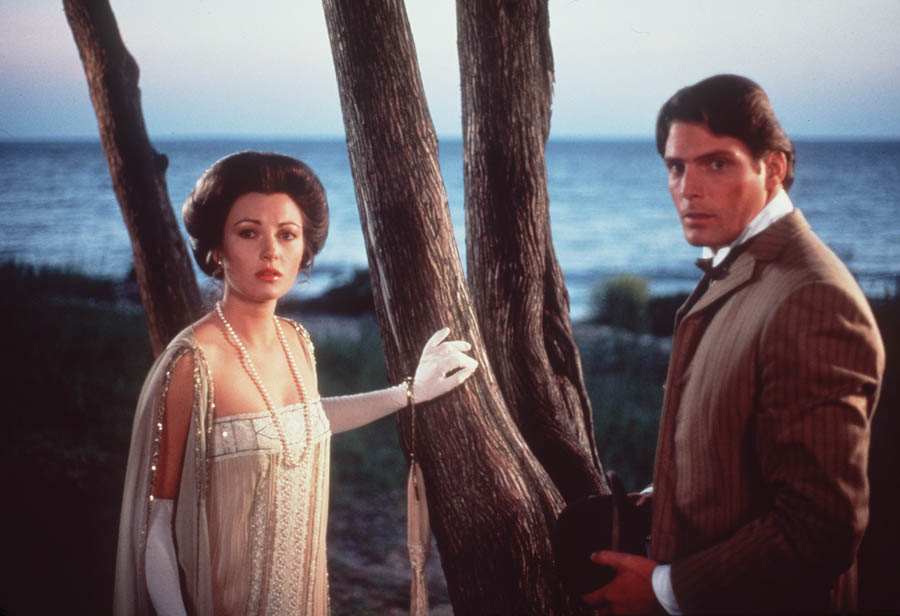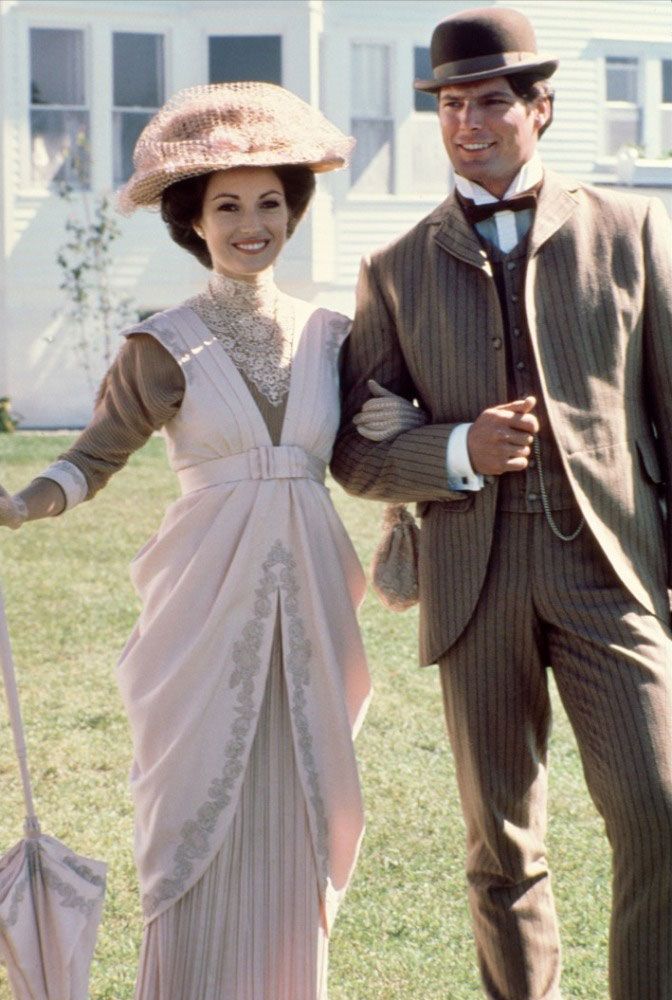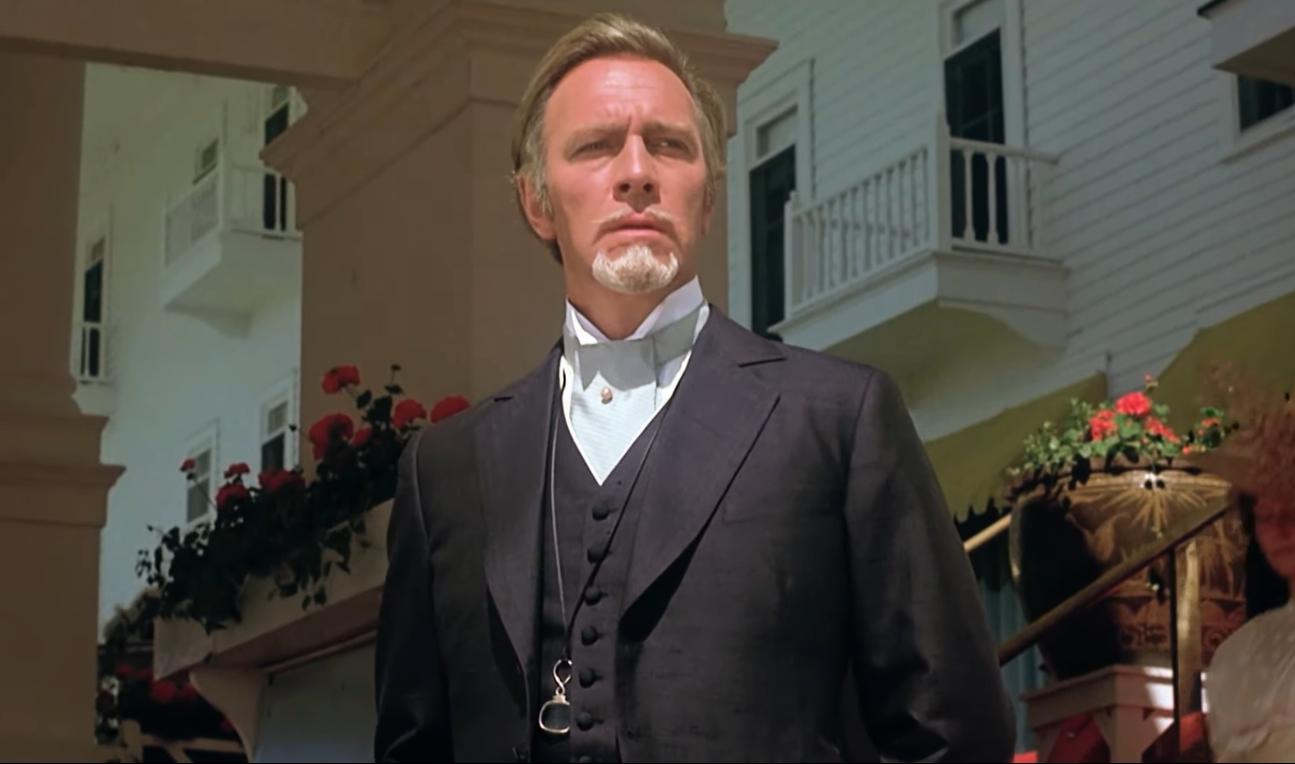Somewhere in Time (United States, 1980)
April 23, 2022
It’s hard to imagine any version of Richard Matheson’s 1975 novel Bid Time Return working. The level of suspension of disbelief is so high that, although can be achieved in a written work, where the imagination is engaged, the same is not true in the more concrete realm of cinema. Although some critics have honed in on Somewhere in Time’s overt sentimentality as its chief failing, I could never get past its hokey means of time travel. In fact, if one considers it with any degree of logic, the movie isn’t about time travel at all. Instead, it’s about a delusion that evolves out of an obsession.
Somewhere in Time opens in the early 1970s at an after-party where newly-minted playwright Richard Collier (Christopher Reeve) is being feted for the success of his debut property. During the celebration, he is approached by an old woman – probably in her eighties – who gives him a pocket watch and encourages his to “Come back to me.” Eight years later, now an established figure, Richard opts to take a break and clear his mind at the Grand Hotel on Mackinac Island, Michigan. While there, he becomes obsessed with a photograph of actress Elise McKenna (Jane Seymour), taken in 1912. He soon discovers that the woman who approached him in 1972 was Elise (on the day of her death). Richard is improbably convinced that he played some part in Elise’s life nearly seventy years prior to the present day and that causes him to look into the viability of time travel.
 Richard approaches Dr. Gerard Finney (George Voskovec) about
the matter and the self-described expert explains that it might be possible via
self-hypnosis to transition oneself out of the present and into the past
provided the circumstances are just right. After initially failing, Richard is
able to complete the transition and finds himself at the Grand Hotel in 1912. He
contrives a meeting with Elise and the two fall in love. But Elise’s confidante
and manager, William Fawcett Robinson (Christopher Plummer), disapproves of the
liaison, perceiving Richard as a gold-digger, and acts to sever any connection
between them.
Richard approaches Dr. Gerard Finney (George Voskovec) about
the matter and the self-described expert explains that it might be possible via
self-hypnosis to transition oneself out of the present and into the past
provided the circumstances are just right. After initially failing, Richard is
able to complete the transition and finds himself at the Grand Hotel in 1912. He
contrives a meeting with Elise and the two fall in love. But Elise’s confidante
and manager, William Fawcett Robinson (Christopher Plummer), disapproves of the
liaison, perceiving Richard as a gold-digger, and acts to sever any connection
between them.
Somewhere in Time is murky and underwritten. The basic premise would be thin even for a Harlequin romance. None of the characters are sufficiently developed to warrant audience investment and the ultimate resolution – a metaphysical glimpse of the afterlife – is more insulting than satisfying. Plus, it’s hard to imagine such undying passion resulting from what is, distilled to its essence, a one-night stand. The film defies any kind of thoughtful examination.
The self-hypnosis method of time travel is idiotic. It’s less plausible than an H.G. Welles time machine or a Doctor Who TARDIS. It leaves open the possibility (perhaps “probability” would be a better term) that the entire 1912 episode (which consumes approximately 2/3 of the running time) is a delusion. After all, self-hypnosis is about training the mind not transmuting a physical mass across a span of nearly seven decades. (In the source material, Richard is terminally ill with brain cancer, which enhances the ambiguity of whether any time travel actually happens.) Even if one was to accept that Richard does physically shift from 1980 to 1912, the methodology of how this happens is difficult (at best) to swallow.
 Putting aside this largely surmountable hurdle, the movie encounters
other problems. Despite having essentially entered a different world, Richard
has little difficulty navigating 1912. His presence is rarely questioned. And his
romance with Elise happens far too quickly to be credible. (It makes sense on
his part, since he was obsessing over her in the late 1970s, but not on her part.)
There’s minimal chemistry between Christopher Reeve and Jane Seymour. They’re
both attractive but Seymour’s character is so thin that there’s little the
actress can do to flesh her out and Reeve, in his first role post-Superman,
shows limited range.
Putting aside this largely surmountable hurdle, the movie encounters
other problems. Despite having essentially entered a different world, Richard
has little difficulty navigating 1912. His presence is rarely questioned. And his
romance with Elise happens far too quickly to be credible. (It makes sense on
his part, since he was obsessing over her in the late 1970s, but not on her part.)
There’s minimal chemistry between Christopher Reeve and Jane Seymour. They’re
both attractive but Seymour’s character is so thin that there’s little the
actress can do to flesh her out and Reeve, in his first role post-Superman,
shows limited range.
The best thing about Somewhere in Time is the score. Composed by John Barry, who took a significant pay cut because of his friendship with Seymour, this represents one of Barry’s all-time best works, alongside the likes of 1976’s King Kong, Dances with Wolves, and On Her Majesty’s Secret Service. He incorporates the 18th variation of Rachmaninoff’s Rhapsody on a Theme of Paganini with his own compositions to create a soundtrack that became more successful than the movie.
 At the time of its release, Somewhere in Time was
justifiably savaged by critics. It wasn’t beloved by the general public,
either, who mostly ignored it during its theatrical run. Only its relatively
low budget kept it from being a major failure for the studio (Universal Pictures).
When it was released on home video, however, it found a more receptive audience
and became a cult classic, spinning off an international fan society that uses
the acronym INSITE ("International Network of Somewhere In Time
Enthusiasts") As with many cult classics, the passion of the most devout adherents
is out-of-step with pretty much everyone else.
At the time of its release, Somewhere in Time was
justifiably savaged by critics. It wasn’t beloved by the general public,
either, who mostly ignored it during its theatrical run. Only its relatively
low budget kept it from being a major failure for the studio (Universal Pictures).
When it was released on home video, however, it found a more receptive audience
and became a cult classic, spinning off an international fan society that uses
the acronym INSITE ("International Network of Somewhere In Time
Enthusiasts") As with many cult classics, the passion of the most devout adherents
is out-of-step with pretty much everyone else.
Despite all the narrative problems and the limitations associated with Reeve’s performance, director Jeannot Szwarc should be given credit for keeping the movie marginally watchable. The pacing is brisk and the cinematography is lush and interesting. There are times when the romance seems to work largely because of Barry’s score and the way Szwarc has framed the scenes, focusing on the attractiveness of the leads and/or the scenery. Overall, however, Somewhere in Time is frustrating as a series of missed opportunities and the passage of more than forty years hasn’t softened the view.
Somewhere in Time (United States, 1980)
Cast: Christopher Reeve, Jane Seymour, Christopher Plummer, Bill Erwin, George Voskovec
Home Release Date: 2022-04-23
Screenplay: Richard Matheson, based on his novel “Bid Time Return”
Cinematography: Isidore Mankofsky
Music: John Barry
U.S. Distributor: Universal Pictures
U.S. Release Date: 1980-10-03
MPAA Rating: "PG"
Genre: Fantasy/Romance
Subtitles: none
Theatrical Aspect Ratio: 1.85:1
- Superman III (1983)
- Superman IV: The Quest for Peace (1987)
- (There are no more worst movies of Christopher Reeve)
- (There are no more better movies of Jane Seymour)

Comments